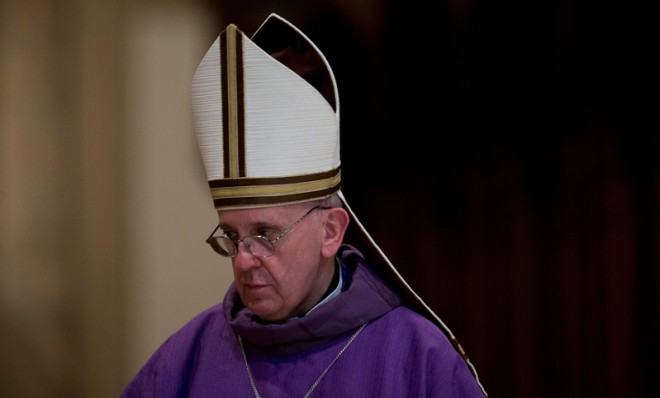Everything you need to know about Pope Francis and Argentina's Dirty War
Old questions resurface as former Buenos Aires Cardinal Jorge Mario Bergoglio becomes the new leader of the world's Catholics


A free daily email with the biggest news stories of the day – and the best features from TheWeek.com
You are now subscribed
Your newsletter sign-up was successful
The Vatican on Friday jumped to the defense of the Catholic Church's new leader, Pope Francis, to counter critics who say he didn't speak out enough during the Dirty War that divided his home country, Argentina, from 1976 to 1983. Vatican spokesman Federico Lombardi said the accusations against the pope — the former Archbishop of Buenos Aires, Jorge Mario Bergoglio — are baseless smears being used by "anti-clerical left-wing elements" to attack the church. "There has never been a credible, concrete accusation against him," Lombardi said. What, exactly, do the pope's critics claim he did — or didn't do?
First off: What was the Dirty War?
It was a dark period in Argentina's history, when, under a military junta, the South American country's armed forces kidnapped or killed tens of thousands of people — estimates of the death toll range from 9,000 to 30,000. Many victims were held in secret for months, tortured, then killed, their bodies never found. The country's military leaders said they were protecting the nation against "subversive elements." The official name for the campaign was Process of National Reorganization, but most people refer to it as the Dirty War.
The Week
Escape your echo chamber. Get the facts behind the news, plus analysis from multiple perspectives.

Sign up for The Week's Free Newsletters
From our morning news briefing to a weekly Good News Newsletter, get the best of The Week delivered directly to your inbox.
From our morning news briefing to a weekly Good News Newsletter, get the best of The Week delivered directly to your inbox.
Why criticize the church for the military's abuses?
Critics of Argentina's Catholic Church leaders from that era say that they, like the hierarchy in Spain during its civil war, were disturbingly close to the junta's anti-communist "witch hunt," says Jon Lee Anderson at The New Yorker. One of Bergoglio's predecessors in his Buenos Aires post, Archbishop Juan Carlos Aramburu, "openly sided with the military's stated need for a purge, in which freethinking priests and nuns were also killed," Anderson says. Some military chaplains allegedly blessed drugged and unconscious guerrilla suspects before they were loaded onto planes and dropped to their deaths. Mostly, though, critics complain that the Church simply remained mute in the face of the repression.
What does this have to do with Pope Francis?
At the time of the Dirty War, Bergoglio was Argentina's provincial, or superior, of the Jesuits, an order that has produced some of Latin America's most socially liberal clerics. A few priests and bishops have since claimed that Bergoglio singled out two leftist priests, depriving them of the church's protection and clearing the way for the military to arrest them. "He portrays himself as popular, almost revolutionary, a man who goes into the ghettos," Argentine journalist Horacio Verbitsky, author of a book on the period called The Silence, tells The Washington Post. "But when the military came to power, he did not protect his own." Bergoglio denies the accusation, noting that nobody ever produced any evidence to back it up, and saying that he personally, quietly, lobbied two members of the junta on behalf of the priests, who were released after five months.
A free daily email with the biggest news stories of the day – and the best features from TheWeek.com
So are the allegations unfair?
Most Argentines recognize "that if Bergoglio had been an active critic of the regime, he would almost certainly not have lived to become pope," says Uki Goni at TIME. "Other churchmen at the time were quickly murdered by the country's merciless generals." A lawyer once tried to open a legal case against Bergoglio in connection with the priests' kidnapping, but it failed for lack of evidence. Now that Bergoglio is Pope Francis, it's important to examine "his record and recollections of nearly 40 years ago," says Eugene Robinson at The Washington Post, "not so much because of what he did or did not do but because of what lessons he did or did not learn." He didn't collaborate or even approve of what the military did, "but by his own admission, he didn't try to change the world. Now he has more than the duty to lead 1.2 billion Catholics. He also has a chance to atone."
Sources: BBC News, The Los Angeles Times, The New Yorker, TIME, The Washington Post (2)
Harold Maass is a contributing editor at The Week. He has been writing for The Week since the 2001 debut of the U.S. print edition and served as editor of TheWeek.com when it launched in 2008. Harold started his career as a newspaper reporter in South Florida and Haiti. He has previously worked for a variety of news outlets, including The Miami Herald, ABC News and Fox News, and for several years wrote a daily roundup of financial news for The Week and Yahoo Finance.
-
 The Olympic timekeepers keeping the Games on track
The Olympic timekeepers keeping the Games on trackUnder the Radar Swiss watchmaking giant Omega has been at the finish line of every Olympic Games for nearly 100 years
-
 Will increasing tensions with Iran boil over into war?
Will increasing tensions with Iran boil over into war?Today’s Big Question President Donald Trump has recently been threatening the country
-
 Corruption: The spy sheikh and the president
Corruption: The spy sheikh and the presidentFeature Trump is at the center of another scandal
